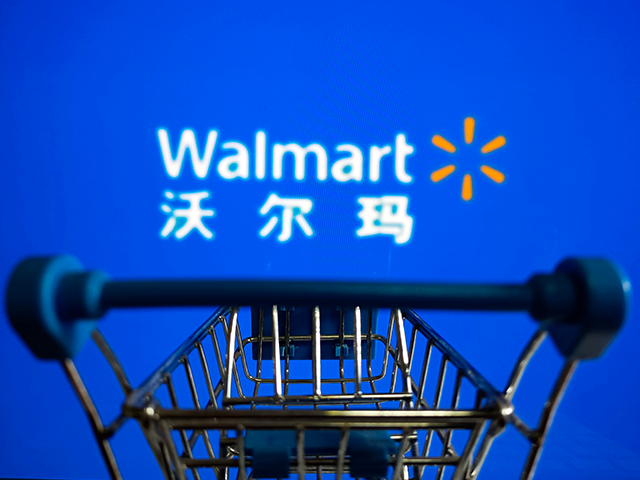Breitbart Business Digest: China Tariffs Will Not Push Up Walmart’s Prices
 CFOTO/Future Publishing via Getty Images
CFOTO/Future Publishing via Getty Images
What Target Tells Us About Walmart
The woes of Target hold a message for anyone who thinks that Walmart will raise its prices in reaction to tariffs President-elect Donald Trump is likely to raise on imports from China.
The message: it’s not happening.
Target’s shares plunged more than 21 percent on Wednesday after the company unveiled quarterly results that disappointed investors, the biggest drop since the pandemic era plunge of May 2022. Comparable store sales grew by a measly 0.3 percent, far less than the 1.4 percent analysts had forecast. The company’s fiscal year earnings forecast came down to $8.30 to $8.90 a share from the previous range of nine dollars to $9.70 a share. Wall Street had been expecting $9.56 a share for the fiscal year.
Walmart shares, by contrast, have rallied three percent after the company reported better-than-expected results and raised its guidance. Comparable store sales jumped 5.3 percent in the quarter that ended October 25, crushing estimates for 3.8 percent sales growth. This was the eleventh consecutive quarter of Walmart beating analyst sales forecasts.
America’s biggest retailer also raised its fiscal year guidance for the third time in a row, saying it expects net sales to grow 4.8 percent to 5.1 percent on a constant currency basis. Just three months ago, it was forecasting sales growth in the 3.75 percent to 4.75 percent range. Shares are up an eye-popping 63.5 percent year-to-date.
After the earnings release, Walmart’s chief financial officer said in an interview with CNBC that it was too soon to say what products might increase in price due to tariffs.
“We never want to raise prices,” CFO John David Rainey said. “Our model is everyday low prices. But there probably will be cases where prices will go up for consumers.”
That mild statement set off a flurry of misleading headlines warning that Trump’s tariffs were probably going to result in higher prices. “Walmart may have to raise some prices if Trump tariffs take effect, CFO says” CNBC declared. “These retailers may raise prices if Trump’s tariffs take effect,” Axios reported.
While not strictly wrong—notice they say that Walmart “may” raise prices, not that it definitely will—the message was clear enough: tarifflation is coming for Trump’s voters soon.
Walmart’s Margins Are Target’s Opportunities
But a closer look at the quarterly results from Walmart and Target suggests that is not the most likely scenario. Walmart’s terrific quarter is not unrelated to Target’s terrible quarter. The largest retailer appears to be taking market share from Target. While Walmart saw strong demand in home products and toys, Target said these were areas of weakness. In other words, America’s biggest retailers are in a kind of zero-sum cage match for customer dollars.

(Bing/Image Creator)
That’s not the kind of situation that gives rise to pricing power. Quite the opposite. If Walmart were to raise prices to preserve its margin on tariffed products, it would be creating an opportunity for Target to take back market share. As Amazon founder Jeff Bezos is said to have remarked, “Your margin is my opportunity.”
Even if it were not facing fierce competition from Home Depot, Lowes, Kroger, Amazon, and Costco, Walmart would have trouble raising prices to offset tariffs. As far as anyone can tell, Walmart’s customers are already maxing out on their spending at the store. If the prices of tariffed products rise, sales of non-tariffed items will fall or the prices will have to come down. Walmart is well aware of this and is unlikely to change relative prices just because tariffs have raised the cost of some of its inventory.
The smarter strategy for Walmart would be to source products outside of China. A decade ago, Walmart’s shelves were heavily stocked with made-in-China products. By some estimates, two-thirds of Walmart’s non-grocery goods were imported, largely from China. Today, the company says that two-thirds of its products are made-in-America. Even the remaining imported inventory is increasingly sourced from outside of China. Instead of chasing away customers by abandoning “everyday low prices,” Walmart is likely to accelerate its decoupling from China.
There’s also a political angle to consider. If Walmart were perceived as raising prices in response to tariffs on China, it’s very likely that at least some of its customers would view this as a rebuke for the Trump trade policies they voted for. In the aftermath of conservative boycotts of Target and Budweiser, companies are rationally wary of alienating customers by taking political stances. Walmart does not want to risk being accused of being anti-Trump for raising prices in response to tariffs on China.
Investors will likely be more accepting of slimmer margins in the short-term while Walmart searches for product sourcing outside of China than they will be of a loss of market share to Walmart’s competitors. And that’s good news for Walmart’s customers. When tariffs rise, Walmart’s prices likely will not.
Source link

